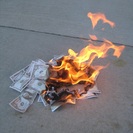
What's a few billion dollars among friends? And by "friends," I mean the American government and General Motors. Cronies, some might say. The government infused some $50 billion of taxpayer funds into GM to keep the automaker from going under a few years ago. This week, the Treasury Department sold off the last of its GM shares. The net loss for US taxpayers: $10.5 billion.
A small price to pay, according to Treasury Secretary Jacob Lew: "Inaction could have cost the broader economy more than one million jobs, billions in lost personal savings, and significantly reduced economic production." But as Reason magazine's Brian Doherty asks, "What might have happened to that money, those resources, those skills, those people, if they had not been diverted by government action?"
Politicians and bureaucrats want nothing more than for us to think them indispensable. We needed them to save us from the financial crisis, they would like us to believe. But government manipulation of the economy, and especially of interest rates and the money supply, is what leads to such massive malinvestment and destructive boom-and-bust cycles in the first place.
Without so much government interference, there would never have been such a large financial crisis. Without government bailouts, a more honest restructuring of the economy could have taken place. GM and Chrysler might have ceased to exist, but Americans would still be making cars. The difference is that all of that money, all of those resources, all of those skilled workers would have been redeployed according to market signals instead of according to bureaucratic fiat. That $10.5 billion did not save a million people's jobs; it just kept some of those people from finding other, more productive work.
Politicians and bureaucrats want nothing more than for us to think them indispensable. We needed them to save us from the financial crisis, they would like us to believe. But government manipulation of the economy, and especially of interest rates and the money supply, is what leads to such massive malinvestment and destructive boom-and-bust cycles in the first place.
Without so much government interference, there would never have been such a large financial crisis. Without government bailouts, a more honest restructuring of the economy could have taken place. GM and Chrysler might have ceased to exist, but Americans would still be making cars. The difference is that all of that money, all of those resources, all of those skilled workers would have been redeployed according to market signals instead of according to bureaucratic fiat. That $10.5 billion did not save a million people's jobs; it just kept some of those people from finding other, more productive work.